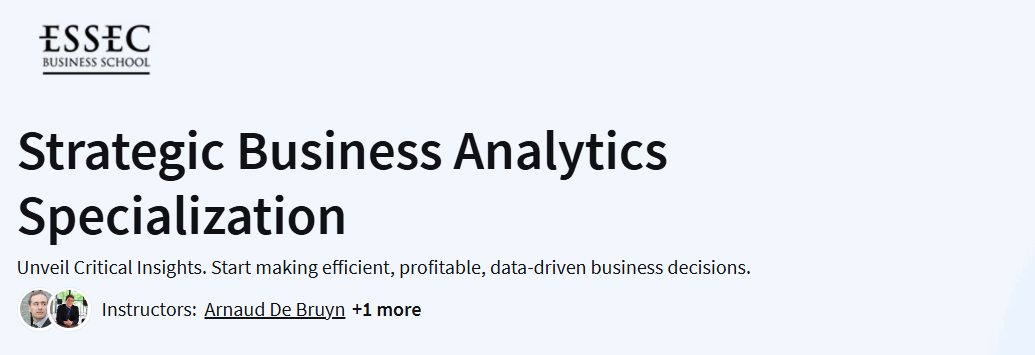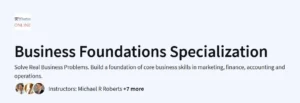What you will learn in Strategic Business Analytics Specialization Course
- Master predictive modeling techniques for business strategy
- Apply machine learning to solve real-world business problems
- Design A/B tests and interpret results
- Develop data visualization dashboards for executives
- Create customer segmentation models
- Optimize pricing and marketing strategies with analytics
Program Overview
Foundations of Strategic Analytics
⏱️4 weeks
- Analytics maturity framework
- Data infrastructure requirements
- Building an analytics culture
- ROI measurement frameworks
Predictive Modeling
⏱️5 weeks
- Regression techniques
- Time series forecasting
- Classification algorithms
- Model evaluation metrics
Business Experimentation
⏱️4 weeks
- A/B test design
- Multivariate testing
- Statistical significance
- Interpreting test results
Applied Business Cases
⏱️6 weeks
- Customer lifetime value modeling
- Price optimization
- Marketing mix modeling
- Capstone project
Get certificate
Job Outlook
- High-Demand Roles:
- Business Analytics Manager (95K160K)
- Marketing Data Scientist (105K180K)
- Pricing Analyst (85K140K)
- Chief Data Officer (150K300K+)
- Industry Trends:
- 72% of Fortune 500 companies have analytics teams
- Analytics-driven companies outperform peers by 5-6%
- 40% year-over-year growth in analytics roles
Specification: Strategic Business Analytics Specialization
|
FAQs
- Consists of 4 courses delivered over approximately 5 months, assuming a pace of 10 hours per week.
- Courses included:
- Foundations of Strategic Business Analytics (~17 hours)
- Foundations of Marketing Analytics (~25 hours)
- Case Studies in Business Analytics with Accenture (~37 hours)
- Capstone: Create Value from Open Data (a deep project spanning ~4–13 hours? likely a typo: intensive)
- Self-paced format allows for schedule flexibility, but completing all components typically takes around 5 months.
- Classified as advanced, designed for professionals already working in analytics or related fields.
- Recommended prerequisites include:
- Strong foundation in statistics and R (or another analytics language)
- Familiarity with database concepts and techniques like regression, classification, and clustering
- A useful option to bridge gaps if you’re newer to analytics would be foundational courses—such as Coursera’s Python or Business Analytics specializations.
- The third course covers real-world case studies in partnership with Accenture, focusing on digital transformation, business consulting, and advanced analytics in industries like media, communications, and public service.
- The capstone project—named Create Value from Open Data—tasks learners with leveraging open datasets to identify insights, create visualizations, and deliver actionable recommendations.
- These components emphasize hands-on, context-rich analytics practice, preparing you to extract strategic value from data in live business scenarios.
- The curriculum fosters mastery in:
- Key competency development includes:
- Advanced analytics using R
- Communication and data-driven strategic decision-making
- The capstone project solidifies these through practice in data synthesis, storytelling, and strategy recommendation.
- While non-traditional credentials like Coursera certificates are not job guarantees, research shows that sharing such credentials notably increases job-seeking success—especially when visible on platforms like LinkedIn.
- On platforms like Reddit, learners underscore that such certificates can help demonstrate initiative and serve as conversation starters, although they seldom suffice alone to secure jobs: “Certifications aren’t enough by themselves, but can tip you ahead… demonstrating passion and basic skills matters.”
“Certificates helped me show willingness to learn; it wasn’t the only factor, but definitely a plus.” - To maximize value: combine the certificate with a portfolio of analytics projects, share your credentials online, and build practical experience.





